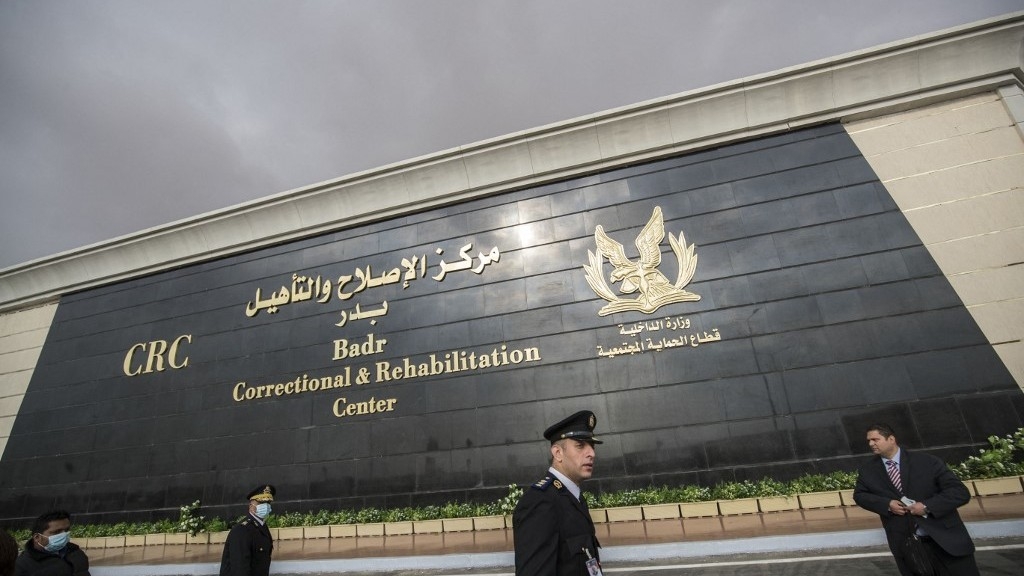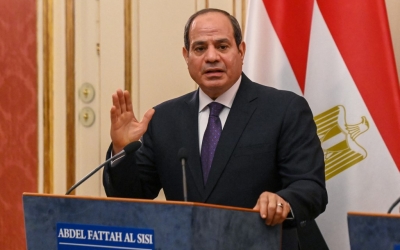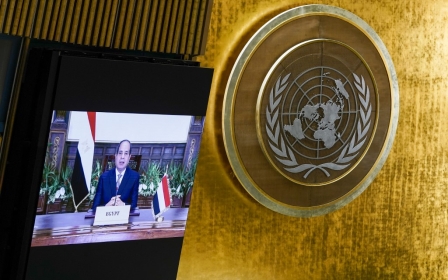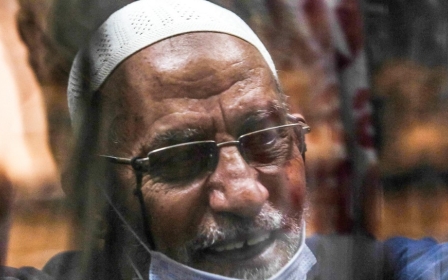Egypt: Why inmates are dying in Sisi's new 'model' prison

On 11 September 2021, Egyptian President Abdel Fattah el-Sisi announced the launch of a National Human Rights Strategy that included plans to modernise prisons.
Soon afterwards, authorities opened two large prison complexes, Badr and Wadi el-Natrun, and a year later they started to relocate political prisoners to the new facilities.
Since becoming president in 2014 Sisi has built at least 28 new prisons, more than a third of Egypt's total number, which is now estimated to be 81.
Sisi promoted the new prison facilities as a model in human rights compliance, but rights groups have criticised them for falling short of international standards.
The Badr prison complex, located 70 kilometres northeast of Cairo, opened in December 2021. It is officially named the Badr Correctional and Rehabilitation Center.
New MEE newsletter: Jerusalem Dispatch
Sign up to get the latest insights and analysis on Israel-Palestine, alongside Turkey Unpacked and other MEE newsletters
It includes three prisons, including Badr 3, where many high-profile political prisoners have been held after being transferred from the notorious Tora Prison complex in mid-2022.
Several Egyptian and international rights organisations have denounced the poor human rights standards at Badr 3, which they claim have led to the deaths of several detainees and prompted mass hunger strikes. Amnesty International said its detention conditions are "comparable to or even worse" than Tora.
The Committee for Justice, a Geneva-based rights organisation, said that it has documented at least five deaths of prisoners due to medical negligence in Badr 3.
Meanwhile, a leaked letter from detainees, shared with Middle East Eye in February, has shed light on the grim conditions inside the prison, including bans on family visits and inadequate healthcare.
ُThe letter said that one inmate, Hossam Abu Shorouk, took his own life in his cell in early February, while another, Mohamed Turk Abu Yara, had attempted to kill himself after prison officials refused to allow him to contact his family, who live in earthquake-affected areas in Turkey. A third inmate, Awad Noaman, also attempted suicide and was transferred to the prison's hospital after wounding himself.
The letter also said that prisoner Mohamed Badie, the 79-year-old leader of Egypt's largest opposition group, the Muslim Brotherhood, has begun a hunger strike in protest against mistreatment and medical negligence.
'We are dying'
In another leaked handwritten letter, obtained by the Egyptian Network for Human Rights in January, prisoners said "we are dying", citing poor living conditions, lack of healthcare, inadequate food, absence of winter clothes, and the spread of diseases among detainees.
Meanwhile, in a report released in October 2022, Amnesty International documented that prisoners in Badr 3 are held in "cruel and inhumane conditions".
"Detainees shiver in cold cells with fluorescent lights switched on round the clock," Amnesty said. "CCTV cameras are trained on them at all hours; and access to basic necessities such as sufficient food, clothing and books is banned.
"They are denied any contact with their families or lawyers and detention renewal hearings are held online."
Amnesty decried Egyptian efforts to paint Badr 3 as turning the page on the country's poor prison culture.
"We are aware of and are investigating the recent distressing testimonies emerging about Badr 3 prison," said Soleimene Benghazi, Egypt campaigner at Amnesty International, speaking to MEE.
"The Egyptian authorities are trying to improve their human rights image, pointing to the opening of new facilities like Badr 3. But unfortunately comparable or even worse abuses are being reproduced there as at the notorious Tora Prison Complex. Instead of opening new prisons where state critics and political opponents languish in abhorrent conditions, the Egyptian authorities should release the thousands of individuals arbitrarily detained, including for peacefully expressing their views."
This article is available in French on Middle East Eye French edition.
Middle East Eye delivers independent and unrivalled coverage and analysis of the Middle East, North Africa and beyond. To learn more about republishing this content and the associated fees, please fill out this form. More about MEE can be found here.





